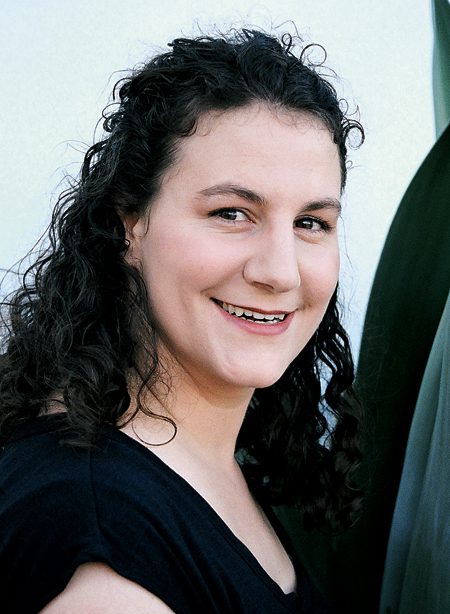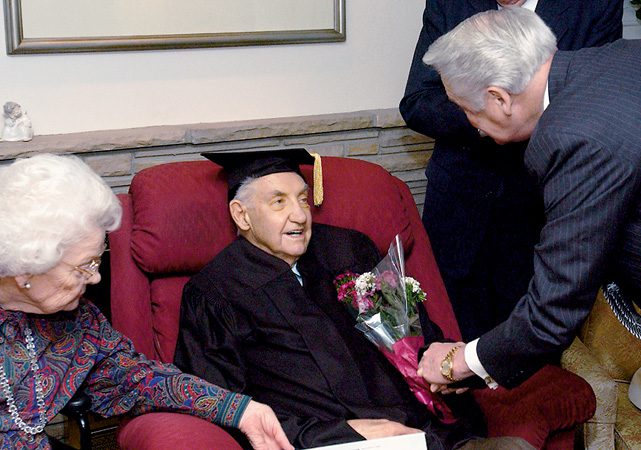
Earning a degree from home just became easier. BYU’s new Bachelor of General Studies degree is designed largely to help former students who left BYU without graduating.
By Mary Lynn Bahr
Students who left BYU without finishing their degrees now have a new opportunity to graduate. On Sept. 1 BYU announced its Bachelor of General Studies (BGS) degree, which replaces the Bachelor of Independent Study. The BGS is better aligned with on-campus curriculum and significantly more flexible than the previous program.
“The former program served a limited number of students well,” says Scott L. Howell, the new director of Degrees by Independent Study. “But it’s time to make it more flexible and expand its outreach. We look forward to helping literally thousands of students.”
In the last 10 years, more than 42,000 students–nearly one in three students who enrolled–left BYU without finishing their degrees. Those numbers have long been of serious concern to faculty and administrators, and the new degree is designed with that population in mind. “They are our students still, and this is just a way of helping them finish,” says Cheryl Brown, associate academic vice president and chair of the faculty committee that designed the new program. “Finish that degree, and it will help you in your earning power. It will help you as you raise your children. It will help you in your life.”
The Bachelor of General Studies is academically stronger than the previous Independent Study degree. “It really is nothing more or less than an extension of the university’s requirements for a baccalaureate degree,” says Howell. Like any other BYU degree, the BGS requires general education classes, 14 hours of religion credit, 40 hours of upper-division courses, and 30 hours of campus residency. BGS students will have Internet and library privileges and will be eligible for federal financial aid. Howell emphasizes that, like all BYU students, those who enroll in the BGS program must abide by honor code standards and maintain annual ecclesiastical endorsement.
The BGS differs from other BYU degrees primarily because it does not involve a specialized major. Students will major in general studies and complete a 30-hour emphasis in an approved study area. Eight study areas are currently available: American studies, English and American literature, family history, family life, history, management, psychology, and writing. Others are being developed.
Response to the new program has been overwhelming. In its first five weeks the BGS office received 140 applications; 61 percent of the applicants are former BYU students.
“People are coming to me and saying this is an answer to their prayers,” Howell says. “It’s going to serve a very legitimate need in the Church and for previous BYU students. It’s humbling to know that we will be able to bless the lives of many people, helping them not just to get a degree but to enhance their lifestyle and improve their marketability and their ability to take care of their families.”
Margo Treece from Gilbert, Ariz., was among the first to apply. “I have a strong inner desire for the education,” says Treece. “I had periodically been going to school, but my life circumstances haven’t been such that I can incorporate traditional classes into my schedule. I’m 53 years old now, so I figure it’s my turn. BYU is very prestigious and that appealed to me. After reading through the literature, it seemed to fit what I had in mind.”
Lynn Jaynes from Filer, Idaho, was another early applicant. Though she attended BYU 20 years ago, she was never able to finish a degree. Jaynes is a writer who wants to refine her skills through the writing emphasis, but she also has other reasons for seeking a BGS degree. “I want to set the example for my kids,” she says. “I want my kids’ sights to be raised, and I want them to see that Mom doesn’t just nag them about report cards, but education is important to her.”
For Jaynes, a BGS degree will also open professional doors; she once had to turn down a teaching contract because she lacked a degree. This benefit was a priority for those who designed the new program, says Neal Kramer, former assistant dean of General Education and Honors and a member of the faculty committee that worked on the BGS. “We thought about people who had left the university before they graduated and who at a certain point in their careers had run into an advancement ceiling because they didn’t have a bachelor’s degree,” Kramer explains.
One of the strengths of the new program is its flexibility. “We were hoping to put a program together that would take full advantage of almost everything a student had done at BYU before,” says Kramer. Credit earned at BYU and most other accredited institutions will be readily accepted, though credits more than eight years old may require evaluation.
“It’s a very flexible program,” Howell says. “Students can continue to work on their degrees through independent study, BYU evening school, the Salt Lake Center, their LDS institute, and their local university or college.” All BGS students must complete 30 hours of campus resi-dency, but former BYU students may have already met that requirement. To help those who do need residency hours, some departments will offer time-shortened courses during spring and summer terms.
Another positive aspect of the new program is BYU’s strong independent study curriculum. Brown explains, “The degree has been enhanced by the fact that we are doing so much work with independent study courses. We’re making more and more of them available over the Web.” About 20 university courses are already online, and at least 30 more courses will be on the Web by the end of the year. A particular strength of the online curriculum is Speedback, an innovative instructional design approach that provides students with immediate, personalized feedback on their work. Internet access and Speedback instructional design will allow BYU to serve thousands more students without burdening the faculty and straining campus resources.
“We’ve always wanted to extend the university to its supporters, to those tithe payers who contribute to the university,” says Kenneth W. Anderson, associate dean of Continuing Education.
“I hope that people who have been here, and the wonderful members of the Church out there who are paying their tithing, know that we’re thinking about them,” Brown says. “We’d like to do what we can to help keep that education going.”
To be eligible for the BGS program, former BYU students must have been away from the university for at least two years, and students who have never attended BYU must be at least 23 years old. To get more information or to request a catalog, contact the Bachelor of General Studies office at (801) 378-4351 (toll-free 1-888-298-3137), by e-mail (bgs@byu.edu), or on the Internet (https://coned.byu.edu/bgs).









